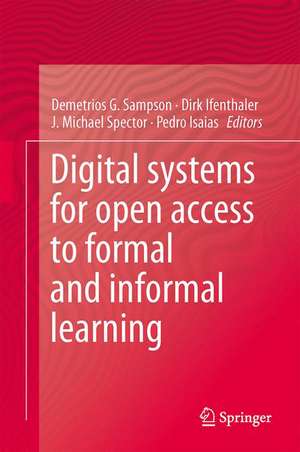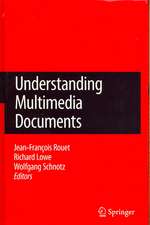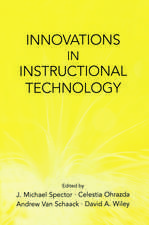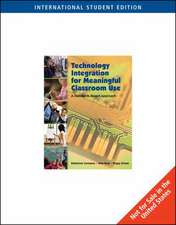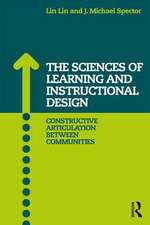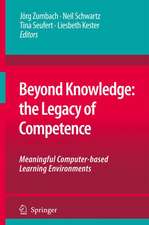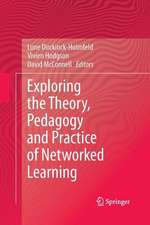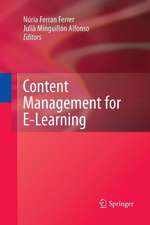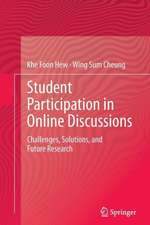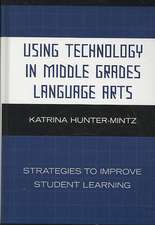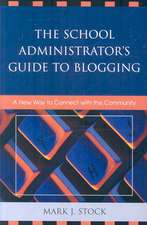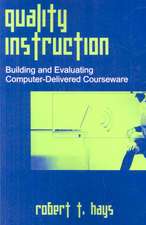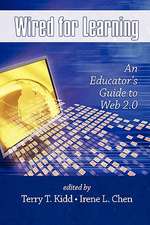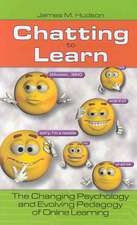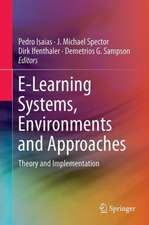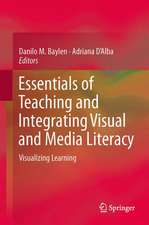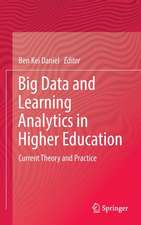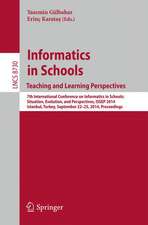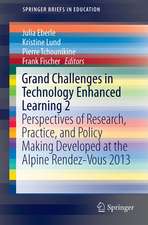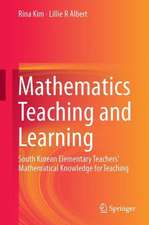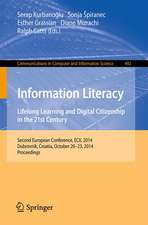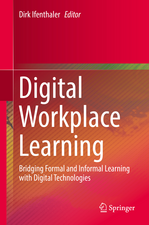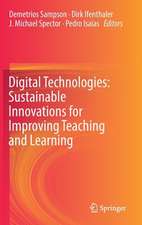Digital Systems for Open Access to Formal and Informal Learning
Editat de Demetrios G. Sampson, Dirk Ifenthaler, J. Michael Spector, Pedro Isaiasen Limba Engleză Hardback – aug 2014
This volume on Digital Systems for Open Access to Formal and Informal Learning contributes to the international dialogue between researchers, technologists, practitioners and policy makers in Technology Supported Education and Learning. It addresses emerging issues related with both theory and practice, as well as, methods and technologies that can support Open Access to Formal and Informal Learning. In the twenty chapters contributed by international experts who are actively shaping the future of Educational Technology around the world, topics such as:
- The evolution of University Open Courses in Transforming Learning
- Supporting Open Access to Teaching and Learning of People with Disabilities
- Assessing Student Learning in Online Courses - Digital Game-based Learning for School Education
- Open Access to Virtual and Remote Labs for STEM Education
- Teachers’ and Schools’ ICT Competence Profiling
- Web-Based Education and Innovative Leadership in a K-12 International School Setting
are presented.
An in-depth blueprint of the promise, potential, and imminent future of the field, Digital Systems for Open Access to Formal and Informal Learning is necessary reading for researchers and practitioners, as well as, undergraduate and postgraduate students, in educational technology.
| Toate formatele și edițiile | Preț | Express |
|---|---|---|
| Paperback (1) | 643.65 lei 43-57 zile | |
| Springer International Publishing – 3 sep 2016 | 643.65 lei 43-57 zile | |
| Hardback (1) | 650.04 lei 43-57 zile | |
| Springer International Publishing – aug 2014 | 650.04 lei 43-57 zile |
Preț: 650.04 lei
Preț vechi: 764.76 lei
-15% Nou
Puncte Express: 975
Preț estimativ în valută:
124.40€ • 129.09$ • 103.98£
124.40€ • 129.09$ • 103.98£
Carte tipărită la comandă
Livrare economică 17-31 martie
Preluare comenzi: 021 569.72.76
Specificații
ISBN-13: 9783319022635
ISBN-10: 3319022636
Pagini: 250
Ilustrații: XIV, 347 p. 62 illus.
Dimensiuni: 155 x 235 x 25 mm
Greutate: 0.69 kg
Ediția:2014
Editura: Springer International Publishing
Colecția Springer
Locul publicării:Cham, Switzerland
ISBN-10: 3319022636
Pagini: 250
Ilustrații: XIV, 347 p. 62 illus.
Dimensiuni: 155 x 235 x 25 mm
Greutate: 0.69 kg
Ediția:2014
Editura: Springer International Publishing
Colecția Springer
Locul publicării:Cham, Switzerland
Public țintă
ResearchCuprins
Digital Systems for Open Access to Formal and Informal Learning.- I. Open Access to Formal and Informal Learning: Theory and Practice.- The Opem Discover Space Portal: A Socially-Powered and Open Ferderated Infrastructure.- The Evolution of University Open Courses in Transforming Learning: Experiences from Mainland China.- Massive Open Online Courses (MOOCs) and Massive Multiplayer Online Games (MMOGs): Synergies and Lessons to be Learned.- Supporting Open Access to Teaching and Learning of People with Disabilities.- Development of Visualization of Learning Outcomes Using Curriculum Mapping.- Assessing Student Learning Online.- Theorizing Why in Digital Learning.- II. Open Access to Formal and Informal Learning: Methods and Technologies.- Mobile Language Learners as Social Networkers.- A Mobile Location-Based SItuation Learning Frameworkf for Supporting Critical Thinking: A Requirements Analysis Study.- Developing Technological and Pedagogical Affordances to Support Collaborative Inquiry Science Processes.- Learning in or with Games?.- Digital Game-Based Learning in the Context of School Entrepreneurship Education: Proposing a Framework for Evaluating the Effectiveness of Digital Games.- Stimulating Learning via Tutoring and Collaborative Simulator Games.- A Methodology for Oraganizing Virtual and Remote Labs.- Creative Collaboration in a 3D Virtual World.- Active Creation of Digital Games as Learning Tools.- Augmented Reality and Learning in Science Museums.- From Teachers' to Schools' ICT Competence Profiles.- I2Flex: The Meeting Point of Web-Based Education and Innovative Leardership in a K-12 International School Setting.
Notă biografică
Demetrios G. Sampson (Department of Digital Systems, University of Piraeus & Informatics and Telematics Institute, Centre for Research and Technology - Hellas, Greece, sampson@iti.gr) has received a Diploma in Electrical Engineering from the Democritus University of Thrace, Greece in 1989 and a Ph.D. in Electronic Systems Engineering from the University of Essex, UK in 1995. He is a Full Professor of Digital Systems for Learning and Education at the Department of Digital Systems, University of Piraeus, Greece and a Research Fellow at the Information Technologies Institute (ITI), Centre of Research and Technology Hellas (CERTH). He is the Founder and Director of the Advanced Digital Systems and Services for Education and Learning (ASK) since 1999. He is the co-author of more than 312 publications in scientific books, journals and conferences with at least 1400 known citations (h-index: 20). He has received 6 times Best Paper Award in International Conferences on Advanced Learning Technologies. He is a Senior and Golden Core Member of IEEE and he was the elected Chair of the IEEE Computer Society Technical Committee on Learning Technologies (2008-2011). He is Co-Editor-in-Chief of the Educational Technology and Society Journal (impact factor 1.171, 2012). He is also a Member of the Steering Committee of the IEEE Transactions on Learning Technologies, Member of the Editorial Board of 22 International/National Journals and a Guest Co-Editor in 26 Special Issues of International Journals. His participation in the organization of scientific conferences involves: General and/or Program Committee Chair in 35 International Conferences, Program Committees Member in 345 International/National Scientific Conferences. He has been a Keynote/Invited Speaker in 51 International/National Conferences. He has been project director, principle investigator and/or consultant in 65 R&D projects with external funding at the range of 14 Million € (1991-2016). He is the recipient of the IEEE Computer Society Distinguished Service Award (July 2012).
Dirk Ifenthaler (Deakin University, Australia, dirk@ifenthaler.info) is the Director, Centre for Research in Digital Learning at Deakin University. His previous roles include Manager of Applied Research and Learning Analytics at Open Universities Australia, Affiliate Research Scholar at the University of Oklahoma, USA, and Interim Department Chair and Professor for Educational Science at the University of Mannheim, Germany. Professor Ifenthaler was a 2012 Fulbright Scholar-in-Residence at the Jeannine Rainbolt College of Education, the University of Oklahoma, USA. Dirk's background is in cognitive psychology, educational technology, statistics, and teacher education. He developed automated and computer-based methodologies for the assessment, analysis, and feedback of graphical and natural language representations. His research outcomes include numerous co-authored books, book series, book chapters, journal articles, and international conference papers. Dirk is the Editor-in-Chief of Technology, Knowledge and Learning and a member of the Editorial Board for Educational Technology Research and Development. He is the 2013-2014 President for the AECT (Association for Educational Communications and Technology) Division Design and Development, 2013-2014 Chair for the AERA (American Educational Research Association) Special Interest Group Technology, Instruction, Cognition and Learning and Co-Program Chair for the international conference on Cognition and Exploratory Learning in the Digital Age (CELDA). Dirk received the 2012 Outstanding Journal Article Award by AECT, 2009 Outstanding Reviewer Award for Educational Technology Research and Development and the 2006 Outstanding Dissertation Award by the University of Freiburg, Germany.
Pedro Isaias (Universidade Alberta, Portugal, pisaias@uab.pt) is an associate professor at Universidade Aberta (Portuguese Open University) in Lisbon, Portugal, responsible for several courses and director of the master degree program in Electronic Commerce and Internet since its start in 2003. He is co-founder and president of IADIS – International Association for Development of the Information Society, a scientific non-profit association. He holds a PhD in Information Management (in the speciality of information and decision systems) from the New University of Lisbon. Author of several books (both as author/co-author and editor/co-editor), journal and conference papers, and research reports, all in the information systems area, he has headed several conferences and workshops within the mentioned area. He has also been responsible for the scientific coordination of several EU funded research projects. He is co-editor of the Interactive Technologies and Smart Education (ITSE) Journal, the editor of the IADIS Journal on WWW/Internet (IJWI) and the co-editor of the IADIS Journal on Computer Science and InformationSystems (IJCSIS). He is also member of the editorial board of several journals and program committee member of several conferences and workshops. At the moment he conducts research activity related to Information Systems in general, E-Learning, E-Commerce and WWW related areas.
J. Michael Spector (University of North Texas, USA, mike.spector@unt.edu) is Chair of Learning Technologies in the College of Information at the University of North Texas. His recent research is in the areas of intelligent support for instructional design, system dynamics based learning environments, assessing learning in complex domains, distance learning, and technology integration in education. Dr. Spector served on the International Board of Standards for Training, Performance and Instruction (IBSTPI) as Executive Vice President; he is on the Executive Committee of the IEEE Learning Technology Technical Committee and is Past-President of the Association for Educational and Communications Technology (AECT). He is the editor of the Development Section of Educational Technology Research & Development, and he serves on numerous other editorial boards. He co-edited the third and fourth editions of the Handbook of Research on Educational Communications and Technology, and has more than 100 journal articles, book chapters and books to his credit.
Dirk Ifenthaler (Deakin University, Australia, dirk@ifenthaler.info) is the Director, Centre for Research in Digital Learning at Deakin University. His previous roles include Manager of Applied Research and Learning Analytics at Open Universities Australia, Affiliate Research Scholar at the University of Oklahoma, USA, and Interim Department Chair and Professor for Educational Science at the University of Mannheim, Germany. Professor Ifenthaler was a 2012 Fulbright Scholar-in-Residence at the Jeannine Rainbolt College of Education, the University of Oklahoma, USA. Dirk's background is in cognitive psychology, educational technology, statistics, and teacher education. He developed automated and computer-based methodologies for the assessment, analysis, and feedback of graphical and natural language representations. His research outcomes include numerous co-authored books, book series, book chapters, journal articles, and international conference papers. Dirk is the Editor-in-Chief of Technology, Knowledge and Learning and a member of the Editorial Board for Educational Technology Research and Development. He is the 2013-2014 President for the AECT (Association for Educational Communications and Technology) Division Design and Development, 2013-2014 Chair for the AERA (American Educational Research Association) Special Interest Group Technology, Instruction, Cognition and Learning and Co-Program Chair for the international conference on Cognition and Exploratory Learning in the Digital Age (CELDA). Dirk received the 2012 Outstanding Journal Article Award by AECT, 2009 Outstanding Reviewer Award for Educational Technology Research and Development and the 2006 Outstanding Dissertation Award by the University of Freiburg, Germany.
Pedro Isaias (Universidade Alberta, Portugal, pisaias@uab.pt) is an associate professor at Universidade Aberta (Portuguese Open University) in Lisbon, Portugal, responsible for several courses and director of the master degree program in Electronic Commerce and Internet since its start in 2003. He is co-founder and president of IADIS – International Association for Development of the Information Society, a scientific non-profit association. He holds a PhD in Information Management (in the speciality of information and decision systems) from the New University of Lisbon. Author of several books (both as author/co-author and editor/co-editor), journal and conference papers, and research reports, all in the information systems area, he has headed several conferences and workshops within the mentioned area. He has also been responsible for the scientific coordination of several EU funded research projects. He is co-editor of the Interactive Technologies and Smart Education (ITSE) Journal, the editor of the IADIS Journal on WWW/Internet (IJWI) and the co-editor of the IADIS Journal on Computer Science and InformationSystems (IJCSIS). He is also member of the editorial board of several journals and program committee member of several conferences and workshops. At the moment he conducts research activity related to Information Systems in general, E-Learning, E-Commerce and WWW related areas.
J. Michael Spector (University of North Texas, USA, mike.spector@unt.edu) is Chair of Learning Technologies in the College of Information at the University of North Texas. His recent research is in the areas of intelligent support for instructional design, system dynamics based learning environments, assessing learning in complex domains, distance learning, and technology integration in education. Dr. Spector served on the International Board of Standards for Training, Performance and Instruction (IBSTPI) as Executive Vice President; he is on the Executive Committee of the IEEE Learning Technology Technical Committee and is Past-President of the Association for Educational and Communications Technology (AECT). He is the editor of the Development Section of Educational Technology Research & Development, and he serves on numerous other editorial boards. He co-edited the third and fourth editions of the Handbook of Research on Educational Communications and Technology, and has more than 100 journal articles, book chapters and books to his credit.
Textul de pe ultima copertă
Today, Digital Systems and Services for Technology Supported Learning and Education are recognized as the key drivers to transform the way that individuals, groups and organizations “learn” and the way to “assess learning” in 21st Century. These transformations influence: Objectives - moving from acquiring new “knowledge” to developing new and relevant “competences”; Methods – moving from “classroom” based teaching to “context-aware” personalized learning; and Assessment – moving from “life-long” degrees and certifications to “on-demand” and “in-context” accreditation of qualifications. Within this context, promoting Open Access to Formal and Informal Learning, is currently a key issue in the public discourse and the global dialogue on Education, including Massive Open Online Courses (MOOCs) and Flipped School Classrooms.
This volume on Digital Systems for Open Access to Formal and Informal Learning contributes to the international dialogue between researchers, technologists, practitioners and policy makers in Technology Supported Education and Learning. It addresses emerging issues related with both theory and practice, as well as, methods and technologies that can support Open Access to Formal and Informal Learning. In the twenty chapters contributed by international experts who are actively shaping the future of Educational Technology around the world, topics such as:
- The evolution of University Open Courses in Transforming Learning
- Supporting Open Access to Teaching and Learning of People with Disabilities
- Assessing Student Learning in Online Courses - Digital Game-based Learning for School Education
- Open Access to Virtual and Remote Labs for STEM Education
- Teachers’ and Schools’ ICT Competence Profiling
- Web-Based Education and Innovative Leadership in a K-12 International School Setting
are presented.
An in-depth blueprint of the promise, potential, and imminent future of the field, Digital Systems for Open Access to Formal and Informal Learning is necessary reading for researchers and practitioners, as well as, undergraduate and postgraduate students, in educational technology.
This volume on Digital Systems for Open Access to Formal and Informal Learning contributes to the international dialogue between researchers, technologists, practitioners and policy makers in Technology Supported Education and Learning. It addresses emerging issues related with both theory and practice, as well as, methods and technologies that can support Open Access to Formal and Informal Learning. In the twenty chapters contributed by international experts who are actively shaping the future of Educational Technology around the world, topics such as:
- The evolution of University Open Courses in Transforming Learning
- Supporting Open Access to Teaching and Learning of People with Disabilities
- Assessing Student Learning in Online Courses - Digital Game-based Learning for School Education
- Open Access to Virtual and Remote Labs for STEM Education
- Teachers’ and Schools’ ICT Competence Profiling
- Web-Based Education and Innovative Leadership in a K-12 International School Setting
are presented.
An in-depth blueprint of the promise, potential, and imminent future of the field, Digital Systems for Open Access to Formal and Informal Learning is necessary reading for researchers and practitioners, as well as, undergraduate and postgraduate students, in educational technology.
Caracteristici
A genuinely multi-disciplinary approach to the use of digital systems for learning Represents the best research from CELDA 2012 Includes both a practical approach and solid research base ? Includes supplementary material: sn.pub/extras
